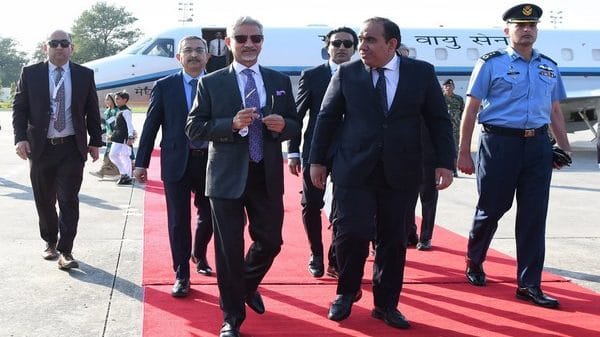The Shanghai Cooperation Organisation summit in Islamabad is being attended by External Affairs Minister S Jaishankar, which marks the first visit by an Indian foreign minister to Pakistan in nine years. Chinese media have underscored the rarity of this visit, emphasising its significance in the broader context of regional geopolitics.
Jaishankar’s visit comes amid heightened concerns over terrorism, particularly following recent attacks on Chinese establishments and personnel in Pakistan. Recently, a convoy of Chinese staff of the Port Qasim Electric Power Company was attacked near Karachi airport, killing two. The Chinese embassy condemned it as a “terrorist attack.” This shows that terrorism in Pakistan should become a shared concern for both China and India.
Chinese-language media and online platforms, however, have largely attributed these attacks on Chinese citizens to Indian involvement. In this narrative, both India and the US are cast as disruptors of China-Pakistan relations. Some commentators have controversially suggested a connection between India and the Baloch Liberation Army (BLA), alleging that India funded the BLA’s operations. These analysts imply that covert actions may eventually come to light, with the timing of Jaishankar’s visit raising further suspicions. Some speculate that the visit might be an attempt to shift global focus and project a more favourable stance toward Pakistan, deflecting attention from India’s alleged ties to the BLA.
The US is also portrayed as a key player influencing India’s actions and exacerbating tensions with China. One Chinese commentator likened the current India-Pakistan dynamic to a ticking time bomb, with the US leveraging India to counter China’s rise. However, India has taken steps to improve relations with China, resisting US pressure. Should Washington exert more aggressive influence, potentially exploiting the fragile India-Pakistan situation—particularly in Kashmir—China may be compelled to intervene due to its close ties with Pakistan. In this scenario, the Chinese analyst argues that India could find itself in a precarious position, reminiscent of Ukraine’s situation.
Also read: To let China invest in India or not—an old economic problem has struck policymakers again
Jaishankar Pakistan visit drives calls in China
Amid Jaishankar’s visit to Islamabad, Chinese online discourse is filled with affirmations of the “ironclad friendship” between China and Pakistan. Calls to strengthen the China-Pakistan alliance have intensified, with suggestions for enhanced intelligence sharing and security cooperation while remaining vigilant against external influences, particularly from India and the US. Analysts argue that the deepening of China-Pakistan relations is a growing concern for India. If Pakistan joins BRICS, its close ties with China could further boost Beijing’s influence within the grouping, a development India would find troubling.
Some Chinese commentators have discussed India’s ambivalence toward the SCO, suggesting that India is uncomfortable with China’s dominant role in the organisation and has subtly scaled back its participation as a form of dissent. As Beijing’s global influence expands, India’s unease with China’s leadership becomes more pronounced, especially given New Delhi’s long-standing self-image as a major global power.
A prevalent narrative on Chinese internet platforms asserts that India lacks a dominant position within the SCO, where the influence of China and Russia is significantly more pronounced. This perspective implies that India’s limited support is unlikely to threaten the SCO’s development; in fact, it may even contribute to the organisation’s unity. Consequently, the Narendra Modi government must acknowledge the reality of India’s restricted influence within the SCO.
Despite these contestation, Sun Zhuangzhi, director of the Russian Institute of Eastern Europe and Central Asia at the Chinese Academy of Social Sciences, optimistically noted that this SCO summit—the first after the latest round of expansion—would address a wide range of issues, including economic cooperation and cultural exchanges.
Also read: As Pakistan gears up for SCO meet, China is giving it sleepless nights—not India
China is turning SCO into a talk shop
The Chinese discourse surrounding the SCO appears to undermine India’s role within the organisation, reducing its mandate to merely addressing bilateral and regional tensions involving India, China, and Pakistan. The SCO has a specific mandate and is not designed to target a country with which both China and Pakistan have longstanding issues. This self-defeating narrative hinders the progress of the SCO; despite differences with Pakistan, Jaishankar’s visit underscores India’s willingness to engage within the SCO framework. However, Pakistan’s induction into the SCO, largely driven by China, seems aimed at undermining India and its concerns regarding terrorism.
The SCO has increasingly shifted away from addressing critical regional security issues, particularly those related to terrorism, which would inevitably require engaging with India’s concerns about Pakistan. China has positioned the SCO as a China-led organisation, promoting the “Shanghai Spirit” and emphasising the term ‘Shanghai’ in the grouping’s name. However, this approach appears to weaken the organisation’s effectiveness, transforming it into a talk-shop rather than a functional body addressing security challenges. Consequently, the SCO has become a platform for projecting the strength of China-Pakistan ties, often sidelining India’s concerns. This shift is evident during this SCO summit in Pakistan, where a collective approach to counterterrorism—a core mandate of the SCO—is conspicuously absent from the agenda.
The pressing question remains: how long can China continue to shield Pakistan from accountability for terrorism, especially when it endangers the lives of Chinese citizens and contradicts the SCO’s fundamental mission of combating terrorism?
Sana Hashmi is a fellow at Taiwan-Asia Exchange Foundation. She tweets @sanahashmi1. Views are personal.
(Edited by Prashant)






